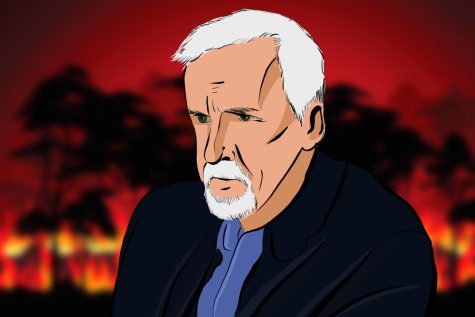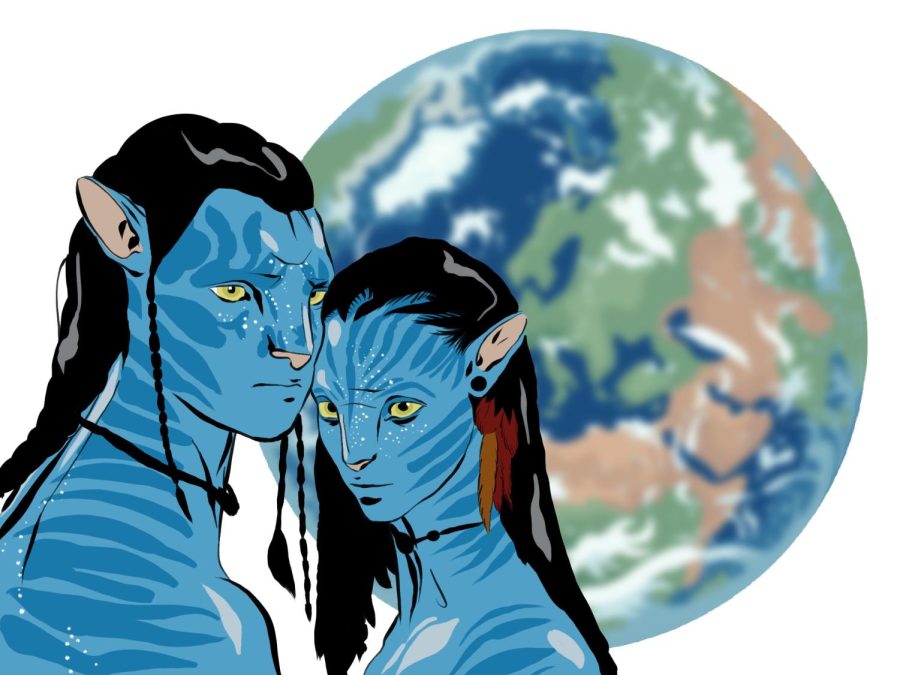“Avatar”: James Cameron’s message to save our planet
In 2009, “Avatar,” the immersive story of a futuristic earth and man’s discovery of a new planet, Pandora, shattered box office records and captured the world’s attention with its breathtaking use of CGI. “Avatar” has held the title of highest grossing movie of all time ever since, and has made nearly $3 billion in revenue.
On Dec. 16, 2022, viewers returned to Pandora when “Avatar: Way of Water,” the sequel to “Avatar,” was released in theaters. After only six weeks, the movie hit the $2 billion dollar mark, making it the third highest grossing movie according to Box Office Mojo.
But why are these movies so significant? After watching “Avatar” and “Avatar: Way of Water,” viewers expressed that they experienced what has been described as “post-avatar depression.” This is a phenomenon that occurs when viewers feel dissatisfied with their own severed connection with nature after seeing “Avatar.” It also describes their uncomfortable feeling when they are faced with themes of humans destroying the Na’vi’s planet and environment, a reflection of what society today is doing to Earth.
The story of “Avatar” starts in the year 2154, on earth covered in futuristic technology, and a prevalent lack of nature and resources. Humans have mined the earth for everything it had to give. Now that humanity is running out of resources, they are in search of another planet to take resources from: A lush planet inhabited by a species of humanoids called the Na’vi. A paralyzed Marine, Jake Sully, travels to Pandora to work with a group of scientists and military personnel, to explore this planet and deal with the native population. In a Na’vi body created from his DNA called an “avatar,” he is able to walk again. Jake is soon introduced to the “Omaticaya” forest clan, learns the ways of the Na’vi and soon falls in love with the Na’vi Chief’s daughter, Neytiri. Jake comes to terms with the fact that what the humans were doing to Pandora was wrong, and together with him, Neytiri and her clan successfully defend Pandora and force the humans to return to Earth.
While the story of Jake Sully, Neytiri, and the victorious Omaticaya clan is beautiful, this movie isn’t solely a love story, or an action-packed adventure. It’s a message from James Cameron.
Climate change is ravaging our planet and we are not reacting. Climate activists everywhere are trying to capture people’s attention but no one is listening– or rather they choose not to listen because the reality and direness of climate change is too difficult to think about. Climate change awareness on social media and the news is not capturing people’s attention, so directors like James Cameron are trying a different approach.
Movieweb has ranked the top 14 movies containing themes of climate change. “Avatar” is ranked #2 falling closely behind Christopher Nolan’s Interstellar. Exploring themes of environmental endangerment in film is one prominent way of spreading awareness. When climate change is depicted through cinematography, the viewer is more receptive because it’s woven into a storyline.

“Avatar” brought to light several themes of human-inflicted damage on Earth. The beginning of the movie displays a futuristic earth where wars are raged over natural resources, and humans have begun the exploration of other planets for valuable metals – specifically an element called “unobtanium.” The humans go to extensive measures to obtain this element, including tearing down a sacred “home tree” where the Na’vi lived. Cameron’s portrayal of pure despair as the Omaticaya clan watched their home go up in flames alongside the heartbreaking soundtrack forces viewers to confront the difficult truth that is humanity’s callous disregard for nature.
In “Avatar: Way of Water” Jake Sully has just uprooted his family because the threat of humans has returned. They flee the forest and seek shelter with a new ocean clan called the “Metkayina.” Here viewers are introduced to an entirely new ecosystem, and the ocean life of a new clan. In the first hour and a half of the movie, the viewer enjoys the Sully family’s careful introduction to their new home. As the Sully family explores Pandora’s ocean tribe, viewers discover humans have inhabited this part of Pandora as well, and have begun poaching the sacred “Tulkun” whale-like creatures, for their oil that stops human aging.
“Avatar” and “Avatar: Way of Water” further emphasize Cameron’s message to humanity: we need to make a change. 14 million tons of plastic end up in the ocean every year killing over one million marine animals including mammals, fish, sharks, turtles, and birds (Sea Turtle Conservancy). Now that the Willow Project has been approved, 239 million metric tons of carbon emissions will be released into the atmosphere over the next 30 years (Aljazeera). Thankfully, directors and visionaries like Cameron are trying to raise awareness and bring about change that will save whatever nature is left.






![Senior River Thompson joins the Jazz Ensemble by singing “That Old Black Magic” by Mercer and Arlen Arr. Mark Taylor, along with senior Annie Brody on guitar and junior Thomas Teixeira on bass, earning big applause. “[The concert had] great energy because it's the last [jazz concert] of the year,” Brody said.](https://www.lhsdoi.com/wp-content/uploads/2025/04/Eight-That-Old-Black-Magic-600x400.jpg)
